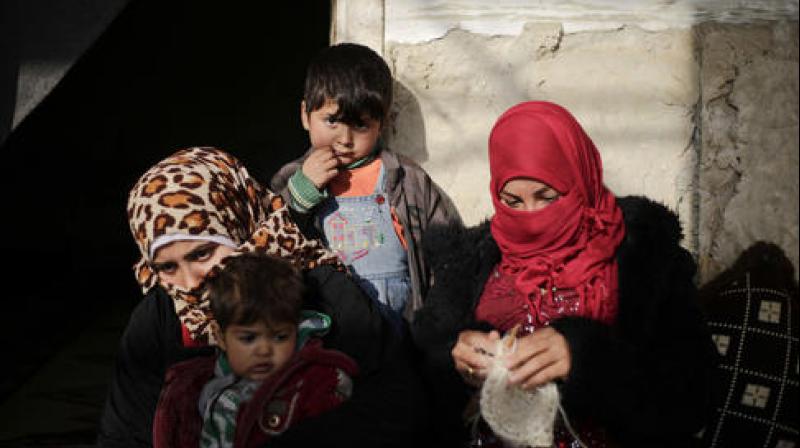From IS to government control, Syrians left with few choices

Safira: Carrying her four-year-old son, Elham Saleh walked all night behind a smuggler, navigating land mines through Islamic State group- and rebel-held territory in northern Syria.
Finally, they reached relative safety in Safira, a government-controlled village on the southern edge of the city of Aleppo, where they have been staying for the past two weeks.
Saleh's husband, once a rebel fighting to topple Syrian President Bashar Assad, had joined IS but she couldn't bear living under the group's brutal rule any longer.
"Once he joined Daesh, I fled with my son, and Daesh began searching for me," said Saleh, using the Arabic acronym for IS and sitting on a couch on the floor of a house that she and her relatives are using in this village southeast of Aleppo.
She, like thousands of others who escaped, paid 60,000 Syrian pounds ($120) per person for smugglers to help them flee IS territory.
As Islamic State-controlled areas in northern Syria come increasingly under attack by an assortment of groups attacking from the air and on the ground, thousands of civilians have been risking their lives to make the perilous journey out, paying smugglers to escape both the shelling and the extremist group.
Many of them, initially opponents of Assad, are now opting to go to government-controlled territory, the most stable option in a war that has turned opposition-held territory into ruins and IS-held areas into large prisons where militants enforce their radical interpretation of Islamic laws.
"Daesh is taking residents as hostages and not allowing anyone to leave," said Youssef Younes, a volunteer who has been helping families displaced from the northern, IS-controlled Deir Hafer region. Younes said he has registered 1,600 families who fled Deir Hafer alone over the past few months.
Younes said most of those displaced are women and children, adding that no one can leave without using smugglers who have good tribal connections and know what tracks to take through mined desert areas.
The extremist group has lost large areas it once controlled in Syria, as U.S.-backed Kurdish-led Syria Democratic Forces and Turkey-backed Syrian rebels push ahead in separate offensives that have left hundreds of people dead on both sides. Turkish-backed rebels are now trying to capture the town of al-Bab, the largest IS-held town in Aleppo province.
Assad has long portrayed the Syrian war as a choice between his rule and that of the extremists, and has maintained a veneer of normalcy in areas under his control throughout the war, now in its sixth year. While the country has been torn into several areas of control and opposition-held territory is pounded by airstrikes, areas controlled by the government have been largely spared the massive destruction and bombings.
Saleh, who fled with her son Abdullah, decided to run away last year after her husband joined IS, a group that she says she hated because they mistreat women and are notorious for their public killings. She currently makes a living by making loofahs, which she and her relatives sell for 20 pounds (4 cents) a piece.
Saleh first fled to her sister's house, shortly before the two began the journey along with other relatives that took weeks, staying for a few days at a time in one village after another so that IS fighters would not notice they were fleeing. Once they reached a front line between IS and other rebel groups, they paid the smugglers who took them to the rebel-held town of Azaz. From there, they drove to government-controlled territory.
Saleh does not know where her husband is. When her son asks about his father, she tells him: "He is in heaven."
Wearing a face veil that revealed only her eyes, she spoke about IS brutality - recalling one day when they shot seven men in the head and crucified them in the square of Deir Hafer for three days in order to scare the town's residents. The victims had been found guilty of raising Syrian flags on some buildings, Saleh said.
"I was shaken and ran away when I saw the swollen bodies," Saleh said.
Samia al-Moussa wasn't so lucky. She fled IS-held territories last year but lost her husband to the extremists. On July 19, 2014, IS fighters knocked on her door in the town of Sheikh Ahmad and asked her husband, Abdul-Fattah, to go with them for some questioning. She never saw him again.
Three months after taking him, IS fighters took Abdul-Fattah to the nearby village of Tel Maksour where they read the verdict accusing him of being a spy for the government. Al-Moussa, holding back tears, quoted witnesses as saying that her husband was beheaded in public.
Two years after the death of her husband, al-Moussa made it to Safira where she and her six children are staying with her brother-in-law, Nafeh.
Mother Agnes Mariam, a nun who assists the displaced, said that some 3,500 families have fled IS-held areas of Maskaneh, Deir Hafer and al-Bab in northern Syria over the past two months alone.
For Ziada Idlibi, 35, fleeing the northern town of al-Bab, currently under attack from Turkish, Russian and U.S. warplanes, was a journey filled with horror. Idlibi and her parents fled with the help of smugglers, but came under intense shelling as they tried to walk through mine-laced territory.
The shelling killed a girl and a boy and "we almost got killed," she said. She said she will only return to her hometown once it is liberated from the extremists who "kill for nothing."
"Those people have no mercy in their hearts," said Idlibi as she carried her identity card, hoping to get assistance.

